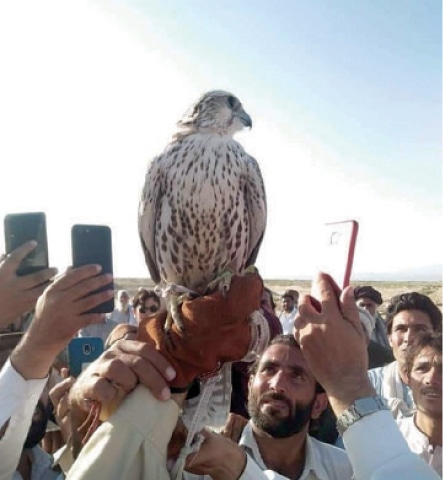
ISLAMABAD: Illegal wildlife trade is thriving on social media and on platforms such as OLX and Facebook, impeding conservation efforts that aim to protect threatened and endangered species.
According to World Wide Fund (WWF) Pakistan Senior Director Programmes Rab Nawaz, trade in exotic birds and animals is impacted by social media because of the accessibility of photos and videos of these species, and by “the increasing popularity of online animal marketplaces.”
Mr Nawaz said unlawful trade in birds and animals on social media was a cybercrime but it had been a daunting task to convince governments to monitor and arrest those involved in online illegal wildlife trade. Efforts to block websites that promote illegal trade in species in Pakistan have not been successful either, he said.
Exotic birds, including endangered falcons and migratory ducks (white headed ducks) and Siberian cranes, endangered turtles, scorpions, reptiles such as leopard geckos and monitor lizards as well as animal hides and trophies are being traded on social media in violation of the law.
Just two weeks ago, a senior Ministry of Climate Change official said an endangered Sekker falcon that had been trapped in Qila Saifullah was auctioned for Rs9.9 million and pictures of it were shared on Facebook.
Holding up his phone, the official then played a video shared online of a compound with nearly two dozen falcons trapped inside. Trapping and capturing migratory falcons has been banned in Pakistan since 2005.
“Another falcon is on sale in Peshawar for Rs70,000. The seller also posted his mobile phone number for more details on the bird,” he said, showing a social media page where the advertisement had been posted.
According to the ministry, between 4,000 and 6,000 falcons of various species could have been trapped from January to December 2019.

“At this rate migratory falcons will go extinct in the next five to 10 years. The Sekker falcon – a bigger, stronger, more agile species of falcon – is a particular favourite with the Arabs. Though Arabs bring captive bred falcons with them when they come to hunt Hubara Bustards in Pakistan, they prefer trapped Sekker falcons for their better hunting instincts and skills,” the official said on condition of anonymity.
Last week, Islamabad Wildlife Management Board (IWMB) confiscated a mounted Ibex trophy that was being sold on OLX illegally for Rs65,000. The board also confiscated a leopard skin from a seller advertising it on the same platform.
“Its sellers have two more leopard skins. The big cats were possibly killed not too long ago,” said IWMB Wildlife Officer Zaheer Khan.
The Punjab Wildlife Department rescued and released a falcon in the Rawalpindi district that was also on sale on social media two weeks ago.
One of the directors of the department, Rizwana Imtiaz, told Dawn that there was an endless war against traders illegally dealing in wildlife.
“We come across two to three advertisements related to the sale of animals almost every week. We have a dedicated staff that monitors such illegal activities on social media,” Ms Imtiaz said.
Conservationists lament that failure to implement laws that protect wildlife counters efforts to save threatened and endangered species.
While the federal and Punjab governments are endeavouring to fight unlawful trade in wildlife in their jurisdictions, the Khyber Pakhtunkhwa, Sindh and Balochistan governments have not taken concrete action to do so.
Published in Dawn, January 5th, 2020














































Dear visitor, the comments section is undergoing an overhaul and will return soon.